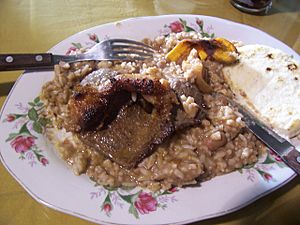Calentao facts for kids

|
|
| Alternative names | Calenta'o |
|---|---|
| Type | Breakfast |
| Region or state | Paisa and Antioquia |
| Associated national cuisine | Colombia |
| Main ingredients | Rice |
| Ingredients generally used | Egg |
| Variations | Calentao' "A Caballo" |
| Other information | no_recipes= false |
Calentao (say "kah-len-TAH-oh"), sometimes spelled calenta'o, is a popular and delicious breakfast dish from Colombia. The name "Calentao" comes from a Spanish word meaning "heated," because this meal is often made from yummy leftovers from the night before! It's a favorite in the Paisa area and the Antioquia region of Colombia.
What is Calentao?
Calentao is a hearty breakfast that helps you start your day with lots of energy. It's usually a mix of different foods that were cooked the day before. The main ingredient is often rice, which is mixed with other tasty bits.
Common Ingredients
People make Calentao with all sorts of leftovers. Here are some common things you might find in a Calentao:
- Rice: This is almost always the base of the dish.
- Beans: Often, leftover beans are mixed in, adding flavor and protein.
- Eggs: A fried egg is usually placed right on top of the Calentao. This is sometimes called "Calentao 'A Caballo'", which means "on horseback."
- Arepa: This is a flat, round corn cake, very popular in Colombia. It's often served on the side or even mixed into the Calentao.
- Other Foods: You might also find pieces of chorizo, ground beef, pasta, or potatoes mixed in. It really depends on what was for dinner the night before!
How it's Served
Calentao is usually eaten for breakfast. It's often served with a warm drink like aguapanela (a sweet drink made from sugar cane), coffee, or hot chocolate. Sometimes, people add a special sauce called hogao, which is made from tomatoes and onions.
A Smart Way to Eat
Calentao is a great example of how people use food wisely. Instead of throwing away leftovers, they turn them into a brand new, delicious meal. It's a tasty way to make sure no food goes to waste! Some people also call it Fríjoles Trasnochaos, which means "beans that stayed up all night."
See also
 In Spanish: Calentado para niños
In Spanish: Calentado para niños
 | Victor J. Glover |
 | Yvonne Cagle |
 | Jeanette Epps |
 | Bernard A. Harris Jr. |

